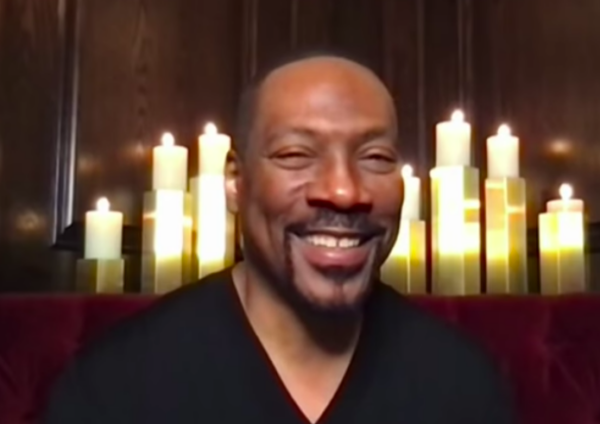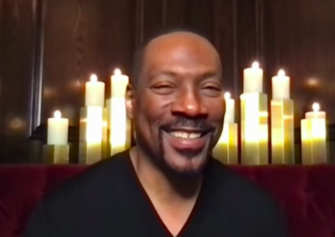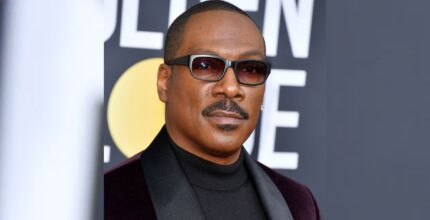A decades-old wager between two comedy legends resurfaced during a 2023 “Jimmy Kimmel Live,” interview and is now making the rounds on social media, forever combining the words of music, stand-up comedy, and Hollywood legend in one powerful punch.

Block office heavyweight Eddie Murphy shared a story about an unpaid $100,000 wager loss he had with his late friend and mentor Richard Pryor on the late-night talk show.
The revelation came during Murphy’s appearance to promote his 2023 holiday film “Candy Cane Lane” and offered a rare glimpse into the personal relationship between two of comedy’s greatest performers.
On the episode, host Jimmy Kimmel produced a vinyl copy of Murphy’s 1985 debut musical album, “How Could It Be,” prompting the “Boomerang” star to share the underlying message behind one of the liner notes.
Among the album’s dedications was a pointed message to Pryor: “To Richard Pryor, my idol, with whom I have a $100,000 bet. No mother—ker, I didn’t forget.”
Murphy explained that the bet originated when he shared his musical ambitions with Pryor and the veteran teased him regarding what the project was bound to sound like.
“When I told him I was doing a musical album, he bet me $100,000 that I wouldn’t put out a music album where there’s no jokes or nothing, it’s just all music,” Murphy recounted.
Adding, “He said, ‘You’ll never do it.’ And I bet him $100,000. And then I did it, and he never paid me.”
Despite never paying him the six figures, the New York native took it in stride and never held it against him.
In fact, he even invited Pryor to join the star-studded cast of “Harlem Nights” in 1989, Murphy’s directorial debut.
That doesn’t mean the “Raw” comic ever forgot about it. With his characteristic mix of humor and nostalgia, Murphy simply quipped to Kimmel and the audience, “He owes me.”
The anecdote carries additional poignancy given Pryor’s passing in 2005 at age 65, with an estimated net worth of $40 million, according to CelebrityNetworth.com.
As one of comedy’s most influential figures, making his mark on the world in the late 60s as a singer and transitioning into comedy in the early 70s, Pryor’s impact on Murphy’s career was profound.
It made sense since, as cultural historian Donald Bogle said in his 2019 book “Hollywood Black: The Stars, the Films, the Filmmakers,” the Peoria native was his big brother in the business.
He noted, “Richard Pryor had cleared the way for Murphy’s ascent, preparing audiences for an iconoclastic, tough-talking, profane African American comedian.”
Murphy himself has frequently acknowledged Pryor’s influence, once stating simply but powerfully, “When I saw Richard, I realized what I was,” according to Entertainment Weekly.
This admission underscores the deep respect Murphy held for his predecessor, perhaps explaining why he never seriously pursued the collection of his winning bet.
While he didn’t collect on the bet with the “Lady Sings the Blues” actor, he can be proud of his musical offering.
Murphy’s 1985 hit “Party All the Time” was more than just a song — it was a cultural moment. Written and produced by funk legend Rick James, the track was the lead single from Murphy’s debut music album.
The song climbed the Hot 100 charts, securing the No. 2 spot for three weeks. It narrowly missed the top spot, which was held by Lionel Richie’s chart-topping ballad “Say You, Say Me,” according to Billboard.
Murphy’s unexpected foray into music, paired with James’ infectious funk influence, made “Party All the Time” an enduring ’80s anthem.
Since this release, he made two other musical albums, Murphy has released three studio albums, including “So Happy” in 1989 and “Love’s Alright” in 1993. None achieved the success as the project that Pryor thought would never happen.
For the Grammy winner (for best comedy album in 1984, not the R&B album or single), the victory in the bet seems less important than the relationship it represented. While the debt remains technically unpaid, it has transformed into something more valuable: a cherished memory of a mentor-protégé relationship that helped shape modern comedy.



